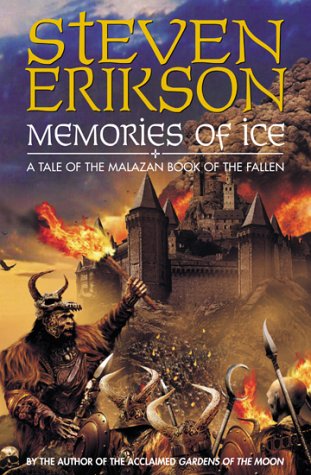 The problem is, I’m about to gush here, and I don’t really want to, because who would take that seriously? Anyway, I decided to pick up Gardens of the Moon last year after seeing it praised so often on my Usenet hangout. And I gotta say, good book. I was confused for the first few hundred pages, and in some ways I still am, but it wasn’t a ‘story is incomprehensible’ confusion, just an ‘I know there’s a lot more here that I can’t see yet’ confusion. (The book is now being published by Tor, which means that it’s more available at a slightly cheaper price, but has worse cover art.)
The problem is, I’m about to gush here, and I don’t really want to, because who would take that seriously? Anyway, I decided to pick up Gardens of the Moon last year after seeing it praised so often on my Usenet hangout. And I gotta say, good book. I was confused for the first few hundred pages, and in some ways I still am, but it wasn’t a ‘story is incomprehensible’ confusion, just an ‘I know there’s a lot more here that I can’t see yet’ confusion. (The book is now being published by Tor, which means that it’s more available at a slightly cheaper price, but has worse cover art.)
I grabbed the next one a few months later, was a lot less confused, and by the end… wow. This Steven Erikson guy knows what he’s doing. I’m thinking that each of these books has its own enclosed theme, and that the theme of this one was sacrifice. Also, I’m thinking that he has, independently of whatever else he hopes to accomplish over the ten volume Malazan Book of the Fallen series, set out to become the definitive author of war imagery. There might be a better depiction of an army on the march through hostile territory, bereft of supply lines out there in the vast expanses of the written word. I know I haven’t found it, though.
And now, Memories of Ice. Both it and the second book, Deadhouse Gates, are sequels to Gardens of the Moon. As such, one could probably choose to read the pair in either order and not have the story spoiled. Of course, the reveal of his world’s secrets is linear, so a few parts of that aspect would be ruined. Most importantly, though, if book 2’s theme was sacrifice, book 3’s is redemption, and that’s not really the kind of thing that you’d want to get out of order, for fear of cognitive dissonance.
Although there are lot more familiar characters that have returned for this volume than for the previous, Erikson never stops introducing new ones. Characters that are almost instantly likeable and, more importantly to me, that are often instantly important to the overall story being woven. The problem is, characters die almost as often as characters are introduced. This is inevitable, though. The very title of the series demands a price in blood. What’s hard to distinguish, from an external perspective, is if the price is ever worth the gain. Don’t take that as a criticism, though. It’s almost always worth it from the perspective of the players, and that’s important. It’s only from my perspective, where characters that I like die to save faceless and often explicitly unworthy civilians, that the cost is high.
Speaking of war, Erikson’s grasp for the definitive this time is the siege. For about a hundred pages in the middle of the book, the city of Capustan is surrounded and assaulted by (of course) vastly superior forces. He put together a chapter that covers a straight 24 hours, in excruciating detail, while at the same time managing to convey the fog of war. And the horror of it; I will now digress for a moment. The soldiery is, for the most part throughout these first three books, very egalitarian regarding gender. As close to a 50/50 split of men and women as makes no difference. Erikson presented evidence of a female soldier having been raped by a male of the invading forces, and I had to do a triple take before I realized that the point they were making is that this kind of thing basically never happens. Brutal though that world is, I was impressed at how much more right they have it than we do, sometimes.
I have three complaints. One is that there’s a decided Fizban factor at work. It may not be the direct analog I was sensing early in the book, but until I find out exactly what’s going on, I’m going to stay annoyed by it. And quite possibly after I find out, if I’m correct. The second is minor, because it’s so brief. There’s a 5 page digression where a few of the main characters meet up with the army’s assigned painter (to capture the history and all, you understand) and his critic, a talking toad. It came from nowhere, and led almost nowhere. (There’s a slight bit of payoff loosely attached to my third complaint, but not enough to justify the jarring weirdness of it all.) The third… well, I’m not sure how to go into it while avoiding major spoilers, so it will go below the cut.
In any case, read these books. They’re each very long, so I can understand how they might seem like a slog if the first book doesn’t immediately do it for you, but there is some real payoff later in the series. And more to come; after reading this one, the titles of the next two (House of Chains and Midnight Tides) mean enough to me to expect more of the same out of the overarching story that ties it all together. And the quality of the writing is enough to expect more of that buttery goodness.
Continue reading